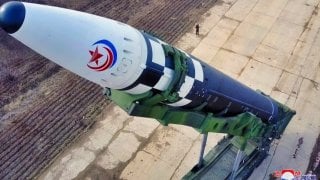Kamala Harris and North Korea: From Strategic Patience to Cautious Engagement?
A possible Harris administration would probably engage the Democratic People’s Republic of Korea (DPRK) less ostensibly than a Trump administration, but it would still show more interest in diplomacy than Biden.
Would Kamala Harris’s and Donald Trump’s North Korea policy differ that much?
A possible Harris administration would probably engage the Democratic People’s Republic of Korea (DPRK) less ostensibly than a Trump administration, but it would still show more interest in diplomacy than Biden. The main trait of Joe Biden’s approach to North Korea has been indifference. Either in coercion or engagement, the Clinton, Bush, Obama, and Trump administrations all came up with their takes. However, Biden was content to repeat that the door of diplomacy remained open without taking any noticeable action.
It is understandable to an extent, as the multiplication of international crises constrained the administration’s ability to engage in new initiatives. But the collapse of the sanction regime, the rapid development of Pyongyang’s nuclear capabilities, its alliance with Russia, and its degrading relations with China are making the status quo inherited from the 2000s untenable. Be it Trump or Harris, change is definite.
Kamala Harris is, obviously, from a younger generation than Joe Biden, who came of age at the height of the Cold War, when the DPRK was considered as little more than a communist Soviet pawn. She saw Barrack Obama approaching a decisive diplomatic breakthrough with North Korea in 2012: the so-called ‘Leap Day’ deal. Although Donald Trump’s summit diplomacy with Kim Jong Un in Hanoi led nowhere, it at least showed that engagement did not equate to surrendering or rewarding Pyongyang, unlike what many on the neoconservative side feared.
Moreover, the Democratic Party’s progressive wing is more vocal on foreign policy than before, and it has less built-in hostility toward the DPRK than traditionally dominant centrists. Hence, the Overton window on North Korea has decisively shifted, making diplomacy less costly politically for U.S. presidents.
Indeed, the recently released Democratic platform failed to mention the 'Complete, Verifiable, and Irreversible Denuclearization' (CVID) of North Korea. Although the campaign was quick to reassure that the nuclear issue would remain a priority, a new Harris administration is unlikely to invest additional energy in trying to pressure North Korea. This move opens the door for diplomacy, as CVID is a nonstarter for Pyongyang.
The hardline conservative South Korean government also seems to assess that the next administration, be it Trump or Harris, is likely to reach out to North Korea. It recently signaled a tentative interest in diplomacy, probably to preempt Washington’s willingness to do the same. Harris would be less willing than Trump to meet Kim in person, but lower-level meetings might happen quickly after the transfer of power.
Engagement could be valuable for three reasons. First, better than anyone else, Harris has witnessed the Biden administration’s overreach by trying to simultaneously beat Russia in Ukraine, bolster NATO’s defenses, support Israel, manage the Middle East, and contain China’s rising power. She will want to reduce the number of hotspots by stabilizing relations with North Korea.
Second, China’s rising power and ambitions will force a refocus on Beijing. Washington will have a strong incentive to settle the DPRK nuclear issue to array all its bandwidth on the Chinese threat and the risk of a major conflagration around Taiwan or the South China Sea. The status quo of maximum pressure on Pyongyang only risks pushing it into China’s arms and facing China and North Korea simultaneously during a showdown with Beijing is obviously not in America’s interests.
Third, trivial domestic politics will also play a role. Biden’s reactive and lackluster foreign policy became a liability on the administration’s balance sheet. Hence, Harris may want to show more ownership and achieve high-profile success overseas early on. As relations with the two great power competitors, China and Russia, are broken beyond repair, North Korea is one of the few key rivals with which a diplomatic breakthrough remains realistic.
In conclusion, the difference between Harris’s and Trump’s North Korean policy would be more of form than of nature. For both, North Korea will be a tertiary issue relative to great power competition, and denuclearization appears impossible for the foreseeable future. However, while Trump might engage in summit diplomacy unilaterally, Harris will likely prefer a more step-by-step warming that takes South Korea and Japan on board.
About the Author: Dylan Motin
Dylan Motin holds a Ph.D. in political science. He is currently a non-resident Kelly Fellow at the Pacific Forum. He is also a non-resident fellow at the European Centre for North Korean Studies and a non-resident research fellow at the ROK Forum for Nuclear Strategy. He is the author of Bandwagoning in International Relations: China, Russia, and Their Neighbors (Vernon Press, 2024).
Image Credit: Creative Commons and/or Shutterstock.


